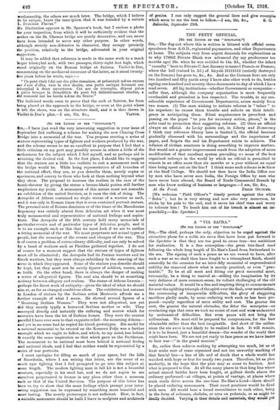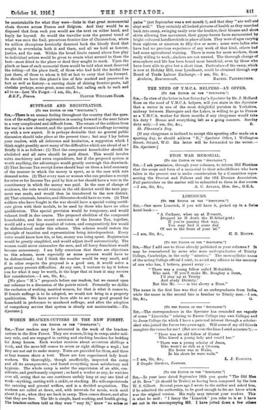A "VIA SACRA."
pro THE EDITOR OF THE 'SPECTATOR.
Sin,—The chief, perhaps the only, objection to be urged against the attractive plans for a noble via sacra that have been put forward in the Spectator is that they are too good to come true—too ambitious for realization. It is a fine conception—the great tree-lined road following the whole long length of No-Man's-Land from Switzerland to the sea. The signing of such a peace as we are vowed to have, after such a war as we shall then have fought to a triumphant finish, should assuredly be the occasion for an inter-Ally memorial of unpreeedented nobility far removed above what is merely practical, or even "prac- ticable." To be at all moot and fitting our great memorial must, necessarily, be a thing to marvel at—stilling the imagination by its very defiance of more common-sense, its valiant challenging of the old material values. It would be a fine and inspiring thing to commemorate for ever the uplifting triumph of the spirit over the flesh, over materialism, the overcoming of insuperable difficulties, the glory of staggering sacrifices gladly made, by some enduring work such as has been pro- posed—royally regardless of more utility and cost. The greater the cost, the greater the natural obstacles, the fitter the enterprise—an everlasting sign that once we took no count of cost and were undaunted by undreamt-of difficulties. But even peace will not bring the millennium. We must still be prepared for compromises, for the best obtainable rather than the best imaginable. And short of the millen- nium the via sacra is not likely to be realized in fact. It will remain, it is to be feared, just a beautiful dream—the wonder of the world that might have been. We are not yet ready to face peace as we have learnt to face war—" in the grand manner."
So, rather than achieve nothing by attempting too much, let us at least make sure of some organized and not too unworthy marking of that fateful line—a line of life and of death that a whole world has watched with hope or fear for nearly two years. Therefore, let us plan modestly, in the hope that the plan- may so come to fruition. And what is proposed is this. At all the many places in that long line where actual named battles have been fought, or gallant deeds above the ordinary performed—at villages, at points of vantage, at places where main roads drive across the one-time No-Man's-Land—there should be placed enduring monuments. Their exact positions would be Sled with care. All would boar a broad resemblance to each other, being in the form of columns, obelisks, or urns on pedestals, or as might be finally decided. Varying in their details and materials, they wOuld yet
be unmistakable for what they were—links in that greet monumental chain thrown across France and Belgium. And they would be so disposed that from each you would see the next on either hand, and haply far beyond. So would the traveller note the general trend of what was once the frail, precarious frontier-line of Christendom, where its million champions heroically dammed back the bloody flood that sought to overwhelm both it and them, and all we hold as honour, justice, and the rest. Within the broad limits named above free play to individual artists would be given to create what seemed to them the best—most fitted to the place or deed they sought to mark. Upon the plinth or base of each memorial there would be told what most deserved the telling—of the place itself, of those who had hold the fateful line just there, of those to whom it fell at last to carry that line forward. So should we have this planet's line of fate marked and preserved in fact as well as history—a curving chain of shining frontier-posts, tall obelisks perhaps, some great, some small, but calling each to each and all to us—Lest We Forget.—! am, Sir, &c.,



































 Previous page
Previous page